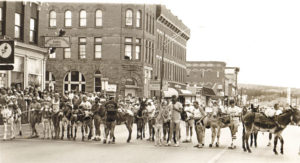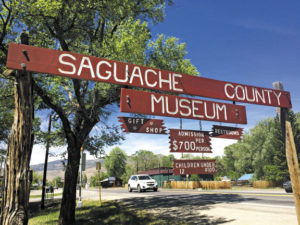By Martha Quillen
The sort of cruel gossip your mama forbade is now a common political ploy employed by both parties. That’s the way campaigns are conducted in the new millennium. Political players grab attention by making stunning accusations about their opponents’ morals, motives, and history, which they liberally supplement with humorous put-downs, and clever insults.
Politics have been moving in this direction for decades, growing increasingly hostile and partisan, until now there’s only one thing Republicans and Democrats agree on: Both sides think politicking has gotten so vicious that the other side should back down.
Does polarization make Americans distrust one another? Do partisan viewpoints skew everyday encounters? More and more evidence says yes.
Reports by the Pew Research Center indicate that Americans haven’t merely gotten more partisan in recent decades; they tend to regard their political opponents more negatively. Recent studies indicate partisan bias impacts totally apolitical decisions. An article entitled “Political Polarization Is Changing How Americans Work and Shop” was released by the Harvard Business Review (May 19, 2017) and cites recent studies. Its authors maintain:
“Our findings show that people evaluate the exact same transaction differently based on whether the other party is a Democrat or a Republican, even though their partisanship ostensibly provides no information about their quality as an employer or seller. (Other studies have found that partisanship shapes how people judge the seriousness of criminal acts, the suitability of someone for a merit scholarship, or whether they would want to date someone).”
They conclude, “Our analysis suggests that partisan-based discrimination may occur even in the most ordinary economic settings, and not just in response to highly publicized campaigns. As such, this type of discrimination should be the subject of more systematic scrutiny – not only from scholars but also from business people, workers and consumers.”
In my view, however, the most convincing evidence that partisan attitudes are leading us astray happened in Denver this June when fights broke out during protests against the imposition of Sharia Law. Really? Sharia law? That’s what Denverites are demonstrating against?
[InContentAdTwo] Clearly the idea of having ancient religious punishments imposed on us is daunting – since I for one don’t want to see anyone stoned to death. But in terms of being a serious threat to life and liberty in Colorado? The imposition of Sharia law ranks way below automobile accidents, theater shootings, unemployment, dying farm towns, getting lost in the mountains, skiing disasters, climbing catastrophes, avalanches, lightning, rock slides, tornadoes, tick-born diseases, having an airplane or vehicle crash into your home, and the lack of ambulance services and medical facilities out on our Eastern plains.
And there’s likewise the possibility that growing populations and increasing recreational usage in mountainous areas will result in more wildfires, increased habitat loss; suburban-style sprawl; dwindling and compromised water supplies; and the spread of noxious parasites (including tubifex worms that carry whirling disease, Zebra and Quagga mussels, pine and spruce beetles, pets-gone-wild, invasive species, and alien fungi, bacteria and blights).
Just a few decades ago, Central Coloradans worried more about those sorts of problems than about Islamic terrorists, Sharia law or anchor babies. And yes, locals fought about development, the use of natural resources, and tourist promotions. But they usually managed to work things out.
Today, however, people tend to hold firmly to their principals. In Salida, whenever a measure seems to be decided, citizens find a new reason to reintroduce it. (If things keep going in this direction, in another couple of decades Salidans may be able to declare the Vandaveer land a historic battle site.)
In the old days, people won some and lost some, and seemed fairly copacetic in between. But that isn’t the current mode of public engagement. Thirty years ago, the economic picture was bleak in Central Colorado, with high levels of job loss and unemployment due to the closure of local mines and rail services.
People weren’t more reasonable back then – unless you consider threatening public officials with handguns a sound strategy (because I definitely remember that happening a lot more four decades ago than it does today – especially in the ranchlands in northern Colorado where I used to live). Yet even so, people arrived at meetings assuming they would have to settle for less than everything they wanted. And they recognized that what the teacher, rancher, and gas station attendant needed and could afford varied, and had to be taken into account.
But now political players tend to divide into interest groups that put their own agendas first and characterize their opponents as ignorant obstructionists. And so it is today. People are divided and feuding about politics in the United States, Great Britain, Belgium, France, Egypt, Turkey, South America and a host of other places. They’re incensed about BREXIT, Trump, terrorism, black lives, immigrants, border security, Islamic refugees, gay rights, minority rights, women’s rights, religious rights, gun rights, wages, climate change, and potential attacks, hacks and pandemics.
All too often, citizens don’t want to negotiate; they want to move in totally opposite directions. So why is political turmoil so unceasing today? A friend recently observed that we may be too connected. She thinks network news, Facebook, Twitter and the Internet are informing us about more atrocities and abuses than we can stomach, and she’s likely right.
Yet our actual problems are so old-fashioned they’re almost traditional. Terrorism isn’t new, nor are disputes between police and citizens. During the Chicago Haymarket Affair in 1886, more than 150 police officers attempted to break up a rally held to protest the killing of a striking worker by a police officer. Someone threw a bomb at the arriving officers, killing one, and police responded by firing into the crowd, killing four attendees and four policemen.
After the event, hundreds of union men and foreign-born workers were rounded up. A grand jury indicted 31 people, and a sensation-loving, yellow press fueled anti-immigrant rage across the nation. So what did the original protesters want? An eight-hour workday (which had already passed into Illinois law in 1867, but wasn’t being enforced). Based on evidence later deemed grievously lacking, eight Chicago labor activists were found guilty in connection with the Haymarket tragedy; four of them were executed, one committed suicide, and three were pardoned by the Illinois governor in 1893.
The deadliest school massacre in American history, happened in Bath Township, Michigan, in 1927, and claimed the lives of 45 persons, including 38 schoolchildren. It was perpetrated by school board treasurer, Andrew Kehoe, who had earlier protested that he was going bankrupt due to the higher taxes he was paying for the five-year-old Bath Consolidated School.
History may not repeat itself, but old issues frequently resurface. A Huffington Post article printed after the Sandy Hook disaster harkened back to the Bath, Michigan, tragedy and asked why we never learn. But we do learn, over and over again.
What we frequently fail to do is differentiate between real perpetrators and suspects. When disasters mount, citizens tend to forget their inclination toward fairness and mercy. Instead, they declare war on one another – and on drugs, crime, Islamic fundamentalists, immigrants, guns and deplorables, which only seems natural in light of acts such as Andrew Kehoe’s.
But what about when huge proportions of the population feel used, abused, put upon, unappreciated and unheard? It’s pretty clear that American citizens and their leaders need to reestablish some perspective – because they are all in this together.
For decades now, campaigns have been liberally dishing out blame, shame, criticism, fear-mongering and finger-pointing. But that has merely incited more crazies like Kehoe.
Embracing malice and mockery as political tactics, merely insures that more innocents will get hurt as more and more frightened people end up literally sticking to their guns – and firing them.
A Salida resident, Martha Quillen hopes the concern academic experts, local and national citizens, and leaders from both sides of the aisle are currently expressing in regard to fake news, partisan hostility, and deliberately antagonistic campaigning will spark some real reform.




